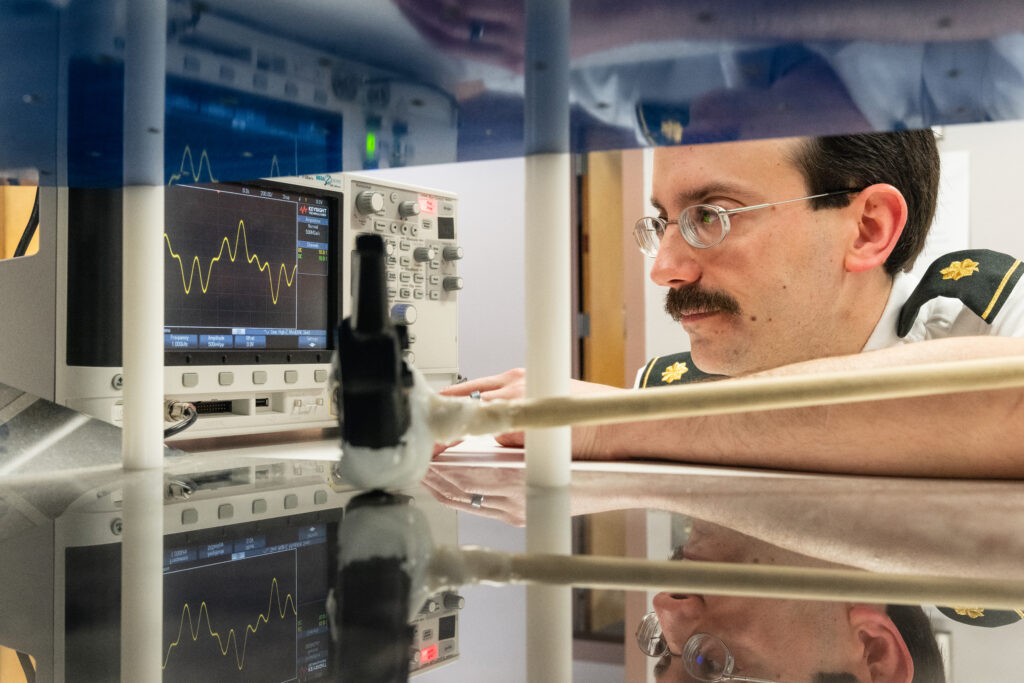Pathway to Your Computer Engineering Degree
The Citadel offers an undergraduate Bachelor of Science (B.S.) in Computer Engineering through a structured 2+2 Transfer Program. Students begin their studies at South Carolina technical schools or another accredited college or university, completing the first two years of their undergraduate coursework. The final two years of the program, including all upper-level courses, are completed at The Citadel through evening classes.
The program is designed and offered to enable the full time student to complete the upper two years of the program and receive a Bachelor of Science in Computer Engineering within two academic years and two summers.

Prepare to Transfer to The Citadel
Here’s what you need to know about the course requirements for the Computer Engineering Transfer Program. This section outlines the courses you will need to complete during your initial studies and the courses required at The Citadel to finalize your degree.
Computer Engineering Transfer Program Course Requirements
| Degree Requirements | Courses Taken at TTC (with credit hours) |
|---|---|
| English (9 credit hours) | • ENG 101 – English Composition I (3) • ENG 102 – English Composition II (3)2 • ENG 260 – Technical Writing (3) |
| Math (12 credit hours) | • MAT 140 – Analy Geom and Calculus I (4) • MAT 141 – Analytic Geometry and Calculus II (4) • MAT 242 – Differential Equations (4)4 |
| Science (16 credit hours) | • CHM 110 – General Chemistry (4) or BIO 101 Biological Science I (4)¹ • CHM 111 – General Chemistry II (4) or BIO 102 Biological Science II (4) • PHY 221 – University Physics I (4) • PHY 222 – University Physics II (4) |
| History (3 credit hours) | • HIS 101 – 499 (3) |
| Humanities & Fine Arts (3 credit hours) | • Any English class except public speaking, Foreign Language class 200:499, Fine Arts class, History class |
| Social Science (3 credit hours) | • Psychology, Sociology, Political Science (American Govt. & similar classes), Economics (Macro/Micro), Anthropology |
| General Elective | • a General Elective (3) |
| Engineering Core | • EGR 269 – Engineering Disciplines and Skills (2) • EGR 275 – Introduction to Engineering/Computer Graphics (3) • EGR 281 – Introduction to Algorithmic Design I (4) • ECE 221 – Introduction to Electrical Engineering I (3) • EGR 283 – Introduction to Algorithmic Design II (4) • ECE 222 – Introduction to Electrical Engineering II (3) • ECE 205 – Electrical and Computer Lab I (3) |
2 Any English class except public speaking
3 Any English class except public speaking, Foreign Language class 200:499, Fine Arts class, History class
4 If not 4 credit MAT 242 from TTC, must be both linear algebra and differential equations
5 Psychology, Sociology, Political Science (American Govt. & similar classes), Economics (Macro/Micro), Anthropology
Courses Required at The Citadel
| Courses Taken at The Citadel (with credit hours) |
|---|
| • EUGS 101 – Intro to The Citadel (1) |
| • ELEC 311 – Digital Logic and Circuits (3) |
| • MATH 206 – Introduction to Discrete Structures (3) |
| • ELEC 306 – Electronics I (3) |
| • ELEC 309 – Signals & Systems (3) |
| • ELEC 313 – Junior Laboratory I (1) |
| • ELEC 312 – Systems I (3) |
| • CSCI 223 – Data Structures and Algorithms (3) |
| • ELEC 330 – Digital Systems Engineering (3) |
| • CIVL 314 – Engineering Economics (2) |
| • ELEC 421 – Senior Design I (4) |
| • ELEC 412 – Applied Probability and Statistics for Engineers (3) |
| • CSCI 420 – Software Engineering (3) |
| • ELEC 428 – Computer Architecture (3) |
| • ELEC 422 – Senior Design II (4) |
| • CSCI 320 – Database Design (3) |
| • Select 1 Technical Elective (3) |
| Approved Departmental Electives (select atleast 4)* |
| • ELEC 401 – Electronics II |
| • ELEC 405 – Electrical Measurements |
| • ELEC 407 – Systems II |
| • ELEC 413 – Advanced Topics in Electrical and Computer Engineering |
| • ELEC 414 – System Simulation |
| • ELEC 416 – Communications Engineering |
| • ELEC 418 – Advanced Digital Systems |
| • ELEC 419 – Computer Network Architecture |
| • ELEC 423 – Digital Signal Processing |
| • ELEC 424 – Solid-State Devices |
| • ELEC 427 – Energy Systems Engineering |
| • ELEC 430 – Independent Research in Electrical and Computer Engineering |
| • ELEC 450 – Electrical and Computing Engineering Internship |
| • CSCI 327 – Computer Security |
| • CSCI 370 – Developing Mobile Applications |
| • CSCI 405 – Operating Systems |
| • CSCI 420 – Software Engineering |
| • CSCI 455 – Artificial Intelligence |
